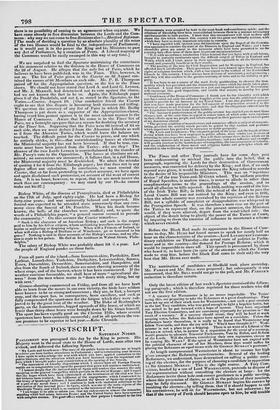We are surprised to find -the Spectator maintaining the correctness
of his statement relative to the division in the House of Commons on the 2d of August. He alleges that the only list of Pairs, which he believes to have been published, was in the Times. This, however, is not so. The list of Pairs given in the Courier on 3d August con- tained the names of 66 Members on each side. Mr. P. B. Thompson paired off for the Appropriation question, as the list in the Times shows. We should not have stated that Lord A. and Lord G. Lennox,
and Mr. J. Maxwell, had determined not to vote against the clause, had we not known the fact to be so. Again, the Edinburgh paper gives 6 of the Doubtfuls, and not 4, as stated In the Spectator, to the Tories.—Courier, August 19. [Our combative friend the Courier ought to see that this dispute is becoming both tiresome and trifling. We question the accuracy of any list of Pairs in which Mr. Bellby Thompson is put down as a supporter of the Appropriation-clause, having heard him protest against it in the most solemn manlier in the House of Commons. Aware that his name is in the Times' list of Pairs, we a fortnight ago gave that as a reason for doubting the accuracy of the Times' list. Supposing that the Pairs were 66 instead of 64 on each side, then we must deduct 2 from the Absentee Liberals as well as 2 from the Absentee Tories, which would leave the balance un- touched. The difficult point for the Courier to prove, arid one which he entirely shirks, is this—that notwithstanding losses at elections, the Ministerial majority has not been lessened. If that be true, con- verts must have been gained from the Tories : who arc they The absence of the two Lords Lennox is counterbalanced by the transfer of Mr. Pusey's vote to the Opposition. The losses at elections are ad- mitted; no conversions are announced ; it follows that, in afu// House, the Ministerial majority must be diminished. We admit the mistake of quoting 4 for 6 from the Edinburgh paper ; but that does not in any degree affect our calculation. In conclusion, we must remind the
Courier, that so far from pretending to perfect accuracy, we have again and again disclaimed such pretension, on account of the want of correct data. It is no boast, however, to repeat, that we are much nearer the mark than our contemporary : we may stand by our 19—he cannot make out his 37.]


























 Previous page
Previous page